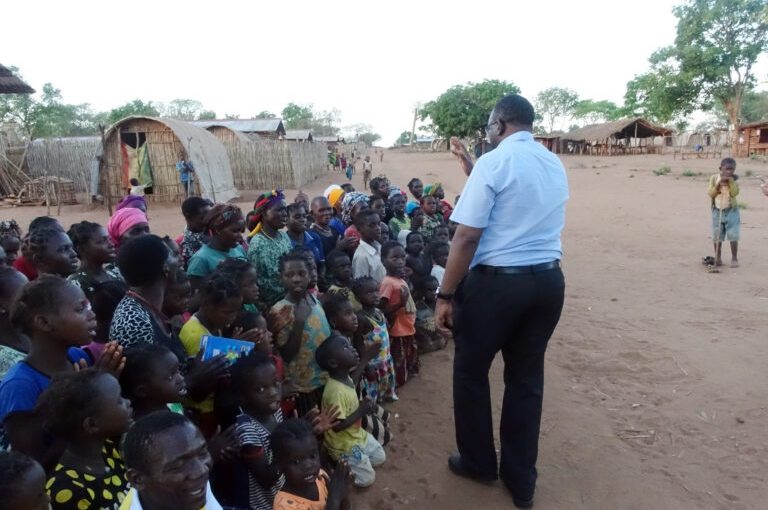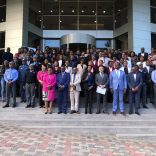Mozambique: Five cases of human trafficking recorded over first semester
Urgent need for humanitarian aid, still no security to return to villages – Bishop of Pemba | Mozambique

FILE - For illustration purposes only. [File photo: Fundação AIS]
The bishop of Pemba told Lusa this Wednesday that there is still no security for the return of people forced to flee the recent attacks in Cabo Delgado, northern Mozambique, and considered help for the displaced “urgent”.
“There is still no security to return to that entire region of Mazeze [one of the villages affected by armed violence] and resume life as it was normally”, said António Juliasse Ferreira Sandramo, bishop of Pemba, capital of the province of Cabo Delgado.
“If that [return of the displaced] happens, it is obvious that the missionaries, the religious people, will also return, because they are at the service of the people,” he said.
The missionaries, forced to flee the latest terrorist attacks in the south of Cabo Delgado province, are displaced and sheltered in safer areas, “but they have not abandoned the people,” he added.
Bishop Juliasse said that the recent incursions by armed groups in Cabo Delgado have worsened the urgency of humanitarian assistance, calling on the international community not to “put the people” of the region “on second place”.
“It is very urgent that humanitarian aid happens here in Cabo Delgado, it is important that we all join forces so that these people are not abandoned”, he highlighted.
The fact that the world is faced with several humanitarian crises, due to conflicts, raises “a very great fear” of Cabo Delgado being “abandoned”, in terms of assistance, he continued.”Since last year, several governmental and non-governmental organizations which are here on the ground and we, as the Catholic Church, stopped r receiving significant support”.
In light of official statements about progress in combating insurgency in Cabo Delgado, Bishop Juliasse stated that reports from the population warn that armed groups continued to be active and carried out attacks on several villages.
“The Catholic Church has always warned and I, personally, as Bishop of the Diocese of Pemba, have been warning about the situation of terrorism. When ,in the country, speeches about a certain respite in Cabo Delgado were being broadcast, I was saying that deaths were continuing to happen because of the war”, he highlighted.
Since January, he added, armed groups have intensified their actions in the centre and south of the province, after the attacks began, in 2017, concentrated in the northern districts.
“It is true that the greatest target of attacks was the northern part of the province of Cabo Delgado and that, from January onwards , there was this incursion into the center and south. But it was to be expected, it was predictable, because the insurgents have always been there and there are no reports of them being definitely fought” he said.
António Julisasse downplayed some reports according to which these armed groups justify their action as a war between Islam and Christians, pointing out that the insurgents destroy and kill indiscriminately, including attacks on mosques in the province.
“The oratory of these groups is in line with the oratory of the Islamic State, to which they say they are affiliated” and, therefore, “we are not concerned as if they were fighting against Catholics”, he emphasized.
The religious leader advocated the fight against extremism and radicalism fostered in many young people recruited by the insurgency in Cabo Delgado.
He also indicated poverty and social exclusion as other factors in young people’s vulnerability, pointing out that the military route is not enough to stop armed violence, despite the country needing Defence and Security Forces capable of defending territorial integrity.
The new wave of terrorist attacks in Cabo Delgado, in northern Mozambique, left 99,313 people displaced in less than a month, according to an estimate released yesterday by the International Organization for Migration (IOM).
At the end of February, the Islamic State terrorist group claimed responsibility for 27 attacks in the same month, in “Christian” villages in the District of Chiùre, Cabo Delgado, in which it claims 70 people died, and also claiming to have destroyed 500 churches, houses, and public buildings. in that southern district of the province.
Moçambique. Bispo de Pemba diz que não há segurança para regresso às aldeias
O bispo de Pemba disse hoje à Lusa que ainda não há segurança para o regresso das pessoas obrigadas a fugir dos recentes ataques em Cabo Delgado, norte de Moçambique, e considerou “urgente” a ajuda aos deslocados.
“Não há ainda segurança para regressar a toda aquela região de Mazeze [uma das aldeias atingidas pela violência armada] e retomar a vida como era habitualmente”, afirmou António Juliasse, bispo de Pemba, capital da província de Cabo Delgado.
“Se isso acontecer, é óbvio que os missionários, o pessoal religioso, também voltam, porque estão ao serviço do povo”, afirmou.
Os missionários, obrigados a fugir dos últimos ataques terroristas no sul da província de Cabo Delgado, estão deslocados e abrigados em áreas mais seguras, “mas não abandonaram o povo”, acrescentou.
António Juliasse avançou que as recentes incursões de grupos armados em Cabo Delgado agravaram a urgência da assistência humanitária, apelando à comunidade internacional para não “secundarizar o povo” da região.
“A ajuda humanitária é muito urgente que aconteça aqui em Cabo Delgado, é importante que todos unamos esforços para que este povo não fique abandonado”, sublinhou.
O facto de o mundo estar confrontado com várias crises humanitárias, devido a conflitos, levanta “um receio muito grande” de Cabo Delgado ser “abandonada”, em termos de assistência, prosseguiu: “Desde o ano passado que várias organizações governamentais e não-governamentais, que estão aqui no terreno e também nós, como Igreja Católica, deixamos de receber apoios significativos”.
Face a declarações oficiais sobre progressos no combate à insurgência em Cabo Delgado, Juliasse afirmou que relatos da população avisam que os grupos armados continuavam ativos e a protagonizar ataques a várias aldeias.
“A Igreja Católica sempre alertou e eu, pessoalmente, como bispo da diocese de Pemba, tenho estado a alertar em relação à situação do terrorismo, quando no país se divulgavam discursos de certa acalmia em Cabo Delgado, eu dizia que as mortes continuavam a acontecer por causa da guerra”, salientou.
Desde janeiro, continuou, os grupos armados intensificaram as suas ações no centro e sul daquela província, depois de o início dos ataques, em 2017, se ter concentrado nos distritos do norte.
“É verdade que o maior reduto de ataques era a parte norte da província de Cabo Delgado e a partir de janeiro houve esta incursão para o centro e sul, mas era de esperar, era previsível, porque os insurgentes sempre estiveram e não há relatos de que definitivamente foram combatidos”, disse.
O bispo de Pemba desvalorizou alguns relatos de que os grupos armados justificam a sua ação como guerra do islamismo contra cristãos, assinalando que os insurgentes destroem e matam de forma indiscriminada, incluindo ataques a mesquitas na província.
“A oratória destes grupos está em consonância com aquilo que é a oratória do Estado Islâmico, a que eles dizem que estão filiados” e, por isso, “nós não estamos preocupados como se estivessem a lutar contra os católicos”, enfatizou.
Aquele líder religioso defendeu o combate ao extremismo e radicalismo fomentados em muitos jovens recrutados pela insurgência em Cabo Delgado.
Também apontou a pobreza e a exclusão social como outros fatores da vulnerabilidade dos jovens, assinalando que a via militar não é suficiente para travar a violência armada, apesar de o país precisar de Forças de Defesa e Segurança capazes de defender a integridade territorial.
A nova vaga de ataques terroristas em Cabo Delgado, no norte de Moçambique, provocou 99.313 deslocados em menos de um mês, segundo estimativa divulgada hoje pela Organização Internacional das Migrações.
O grupo terrorista Estado Islâmico reivindicou no final de fevereiro a autoria de 27 ataques no mesmo mês, em vilas “cristãs” no distrito de Chiùre, Cabo Delgado, em que afirma terem morrido 70 pessoas, destruindo ainda 500 igrejas, casas, e edifícios públicos naquele distrito do sul da província.













Leave a Reply
Be the First to Comment!
You must be logged in to post a comment.
You must be logged in to post a comment.